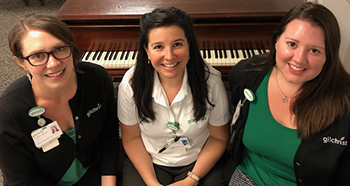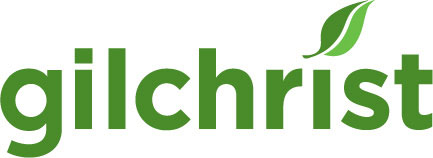All You Need Is Love…and Music Therapy
The 2nd annual fundraising event for Gilchrist’s Music Therapy program will be held on February 8, 2020. Read on to learn how music therapists make a difference in the lives of patients and families.

“All You Need Is Love” is a song made famous by The Beatles in 1967. Some may consider the message of this song basic or the monotony of the lyrics uninspiring, but the band was tasked with creating a song that provided “a message that could be easily understood by everyone.” The band’s manager said at the time, “The nice thing…is that it cannot be misinterpreted. It is a clear message saying that love is everything.”
More than 50 years after that song was first played, as the Gilchrist Music Therapy program moves into its 8th year and is busy preparing for its 2nd annual fundraising event— All You Need Is Love…and Music Therapy —the intent of this simplistic melody speaks directly to the work of the Gilchrist music therapy team: we use music to make a difference.
I can still recall—as a beginning music therapy intern at a cancer center in 2004—struggling to know what to sing or play for a patient. After later sharing with my supervisor that I felt helpless, the words she spoke to me are something I still teach today: “Let the love you have for your patient guide the music.”
Whether it’s a patient with late-stage dementia singing the entirety of “You Are My Sunshine” or an otherwise unresponsive patient tapping their feet along with the rhythm of a song, our Gilchrist music therapists are there, singing and playing, bringing joy and comfort, demonstrating our care for patients and families with a resounding, “Yes…love IS all you need!”
Music Therapy Is Made Possible by Donors
Last February, the Gilchrist music therapy team held its first fundraising event, an evening of popular love songs performed as a cabaret. The night was a huge success, featuring stories and a chance for us to sing and play about what we love, our patients.
So, why does this critical part of our patient care need funds? It still comes as a surprise to many when they find out that music therapy does not receive direct reimbursement. And yet, we still so often hear things like, “I couldn’t imagine hospice without music therapy.” The work we do is 100% funded through the generosity of our donors.
And through the generosity of our donors and with the support of Gilchrist, the Music Therapy program has grown over the years to three full-time, board-certified music therapists. The success of this program is driven by the creativity, talent, and yes, love, of those who provide music therapy.
Perspectives from Our Music Therapists
Two of our music therapists shared their perspective on what being a Gilchrist music therapist means to them.
Jillian Tolman
“Being a music therapist at Gilchrist is a dream job for me—a career that I’m proud of. When I tell people I’m a music therapist at Gilchrist, I can smile, knowing that I am making a difference.
This year, one of my goals was to work more with veterans. I was honored to provide over 25 Salutes to Service in addition to participating in community Veteran’s Day celebrations. I feel the support from the community to be a great music therapist. Gilchrist truly understands the need for music therapy.
Never could I have imagined how significant and enjoyable last year’s “All You Need Is Love…and Music Therapy” fundraising concert could be. The evening was elegant, energetic and absolutely beautiful. The event showcased patient stories, advocated for music therapy and raised funds so that we may continue our work that makes such an important difference.
I want to say thank you to the community, to Gilchrist, and to our patients and families for using music therapy. Your support means the world and I am forever grateful.”
Emily Mahoney
“Being a music therapist at Gilchrist means being part of a compassionate team that goes above and beyond to serve our patients. Gilchrist recognizes the value of music therapy for our patients and families and has fully supported our program.
When I tell people I’m a hospice music therapist, I often hear, ‘That must be so hard.’ Of course, it can be, but the feeling that I associate most with my work is joy—moments when the music brings a smile to someone’s face or prompts someone to reach out a hand to hold.
It is the joy of watching toes start to tap and couples moving just a little closer together, but it can also be from the comfort a song can bring to grieving families. There is joy when music opens the door to a difficult conversation or when pain subsides, bringing peace. As a music therapist, I am fortunate to witness truly profound moments that are made possible through music.
A patient’s spouse recently said to me, ‘He can’t speak anymore, but he sings, and that’s amazing!’ Though this patient has Alzheimer’s, when he has music therapy, he can sing, tap his toes, smile and lean over to his wife for a kiss. The music is a reminder that he is still himself, and he is there. Music therapy helps this patient, and so many others, spend the end of their lives living.
When I reflect on my work as a hospice music therapist, I am reminded of this quote by music therapist and author Colin Lee: ‘As therapists, we gain more than we can ever hope to give our clients. We are allowed to be with them at times of great uncertainty and distress. The privilege they give is to allow us to be with them at these crossroads in their lives. We should never take this honor lightly.’”
All you need is love, all together now
All you need is love, everybody
All you need is love, love
Love is all you need
Please consider being a part of our love song and join us on Saturday, February 8, 2020. To learn more and buy tickets, visit gilchristcares.org/allyouneedislove.


